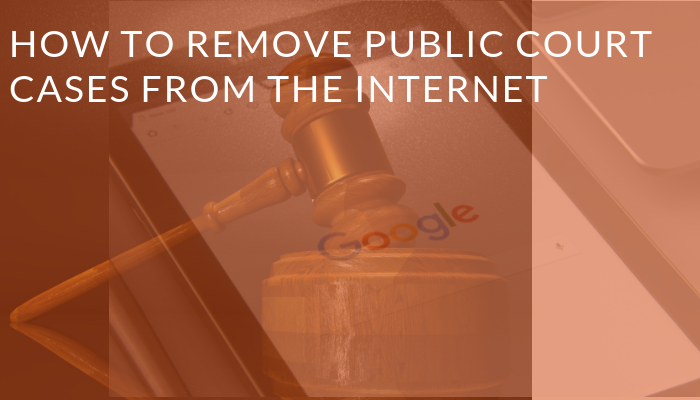Removing Old Public Court Records from Internet Search
As news publications move increasingly from print to an online focus, many issues are being thrown up around privacy, especially in the case of criminal records and court cases. The way the legal system works should allow an individual who has been arrested on suspicion of a crime and not charged, or found not guilty, to carry on with their life as normal, as if the arrest never happened. They will have a clear criminal record (as they should, as they have not been found guilty of a crime) and should be able to disassociate themselves from the details of the court case or arrest.
As more and more publications digitize their databases, however, increasing numbers of people are finding out of date information related to past arrests and court cases, even when their criminal records are completely clear of any such incidents.
Clearly, this can have a hugely negative effect on people’s lives. There are many reported cases of people struggling to find or keep employment, or even get a date, because when businesses are hiring, or people want to know more about a prospective date, they generally turn to Google, where the old court record is often the top or only listing relating to that person’s name.
Wiping your digital record clean
So how can people combat this problem? One proposed solution, changing your name, is an extreme way to solve the problem, with associated costs and inconveniences that render the option unrealistic for most people. Another option is to pay a PR company or reputation management firm to clear internet searches of any unwanted results. Many people, especially those innocent of any crime or wrongdoing, object to having to take such extreme measures to re-establish their reputation when they have been found guilty of no crime.
How do you get old arrest articles and details about court cases removed from Google, then?
Unfortunately, people who find themselves in this position are unlikely to make any great headway by approaching Google directly. Google's search platform does not host or create the content in question, it merely indexes it. URLs can be reported to Google for removal from the search listings, but the request will only be honored if the article is in breach of privacy or other laws, which is unlikely to be the case here. The best initial approach is to contact the publisher of the article and ask them to withdraw it. See Google's useful guide to contacting a webmaster for tips on how to do this if the site does not have clear contact information.
Dealing with legal research websites, court case search engines and other online publishers of public records
In many cases the publisher will remove the information, or add an amendment to say that the charges have been dropped, the individual's criminal record expunged, or that they were found not guilty if the case made it to court. However in many cases the outcome will be less positive; in fact many publishers have rules against unpublishing old content, stating that they will not rewrite history', and if it is a court case, unfortunately it is a matter of public record, and public record makes no distinction between whether the information is available in printed form or on the web.
The good news is that even though the details of the case have to stay on public record, you can request that sites, such as public.resource.org for example, implement a small piece of code blocking the page from search engines, which will go some way towards resolving the issue.
How do you clear the case off Google and other Search Engines
Once the court record website or publisher of the old court case(s) has agreed to remove the information pertaining to your arrest, court case, or criminal record, amend it, or implement the code to prevent the page from being indexed by Google and other search engines, the details in question should naturally drop out of the search results over time. Google crawls the web regularly, indexing web pages as it goes, and replaces old information with new, to keep their search listings up to date.

This process means that the information about your case will eventually be removed from the listings following successful negotiation with the publisher. However, as Google also makes use of cached (stored) pages, if you want to be entirely sure that your criminal record or court case is removed from Google, you should contact them to submit a request for the removal of a cached page.
- Remove snippets and cached content for pages that you DO own - https://www.google.com/webmasters/tools/removals
- Remove snippets and cached content for pages that you DON'T own - https://support.google.com/webmasters/answer/7041154
What to do if the publisher refuses to remove, amend, or prevent search engines from crawling the page. If your negotiations with the person who published details of your arrest or court case are unsuccessful (which they may well be), the best course of action is to resort to some reputation management. We are among the top reputation management companies who can do this for you; however, there are some relatively simple steps you can take to start to turn the situation around on your own.
How should you handle old court case records you can't get removed?
First of all, search for yourself in different ways and make a note of the keywords that bring up the negative search result. These will come in handy when you start to build your positive reputation.
The next step is to start creating pages in high-profile social networks and blogs and try to use as many of them as you can. This great article from Abine Inc. has a good list of places to start. This is where you can make good use of your keywords. Use the keywords that previously brought up results about your court case, arrest, or criminal record, and build them into positive content. This way, Google is more likely to return positive content when people enter these search terms. Find unrelated news articles and review sites, and post reviews using your real name. These won't make as much of an impact as creating the other pages, but every little helps.
You should also try to link between your social media accounts; for example try linking your Facebook page to your Flickr page, and your Flickr page to your Twitter account, and so on. This all helps to build your positive online profile, and eventually, you should knock that old court case, negative blog post, news article, or another unwanted search result, from the front page of search engine results, at the very least.
The process is known as search result suppression. You can read more about it here.
Call Defamation Defenders Today to Clean Up Your Public Court Cases Online
For more difficult legal publications and more busy professionals, calling in professionals may be your best course of action. Certain websites are non-responsive to content removal requests, others can be difficult to work with and many are unwilling to remove case records without special circumstances being met. your court cases on Google Search and ensure that your reputation is positive online.
We encourage anyone having difficulty removing public case records from a legal research website and getting this private information off search results to contact us today and speak with one of our experienced online reputation advisors. Defamation Defenders public record removal and online reputation repair solutions have helped 1000s get unwanted court case information off Google, Bing, DuckDuckGo and other search engines and establish positive reputations online.
Get help removing public court records from Google
Call us today at (800) 785-1749 or shot us an email at support@defamationdefenders.com to learn how our experienced team of reputation repair and removal experts can help you get public court docket records removed from websites, deleted off search engine results, and erased from the internet for good!
Want more info on repairing your personal reputation or managing your web presence?
Our team of online reputation management experts work hard to ensure that our blog, which we like to call The Defamation Defense Blog, is packed full of useful information and actionable DIY advice on personal reputation management that will not only help you repair damage to your personal online reputation, but put you in charge of your name and information on the internet.
Take a look at the blog posts below to start furthering your personal online reputation management knowledge and ability.




